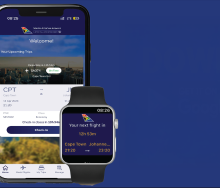A global transition is under way in the cruise industry as the average age of cruise passengers is falling. The South African market, however, is seeing a trend of multi-generational cruisers.
Royal Caribbean Cruises CEO, Jason Liberty, said at the company’s second-quarter earnings call last month that Generation Z and millennials were now the company’s fastest-growing customer base, with one out of two passengers being a millennial or younger.
This is in line with data from the Cruise Lines International Association (CLIA), which revealed that the average age of cruise passengers was getting younger, and that 88% of millennials who had already cruised were planning to go on another cruise in the future.
CLIA’s latest State of the Cruise Industry report found that the average age of cruise passengers was 46, showing a drop from the 2022 average of 47,8.
In the local market, the cruise passenger age may be getting younger, but experts say this is due to a focus on family and multi-generational travel.
The average age of a South African cruise passenger, according to Ross Volk, MD of MSC, is younger than in the rest of the world, at approximately 45 years old.
“I think because there wasn’t so much of the traditional market that existed in the rest of the world from the 1950s to the 1980s, cruising has exploded in South Africa amongst the whole population.”
Volk said MSC’s biggest customer base at the moment was those between the ages of 18 and 59. “It’s about family and it certainly is about the younger generation.” The company sees this as a family-oriented market.
Thaybz Khan, Head of Product for Cruises International, which represents Royal Caribbean in the South African market, said this was likely because cruising holidays were well suited to a multi-generational market. “If you reference a brand like Royal Caribbean, one can see that the on-board experience, from activities to entertainment, offers something for everyone, irrespective of age.”
However, luxury and boutique cruising brands are becoming more intent on adapting their offering to a younger demographic, according to Khan. “This is great for the global cruise market as we are now collectively working towards a wider target market which may not have been a strategy in the past.”
Gaynor Galbraith Neill, CEO of Cruise Vacations, agreed. “We specialise in the luxury genre, and so the products we sell typically serve Baby Boomers and Gen X. However, multi-generational group travel is becoming more common. This both introduces the younger generations to cruising and also affects the overall average age.”
Neill has seen this focus on family reduce the cruise passenger age in luxury cruising by 20 years in her 30 years of specialisation in the industry.
She credits this family travel trend to a significant growth in family-style, resort ships. In the premium, luxury and expedition products, however, she said she had noticed a change in style that is aimed at attracting a new, younger clientele.
“There is definitely a move away from the old world of cruising to a more contemporary and casual environment focused on experiences, culture and culinary adventure. This has perhaps changed the opinion of the younger traveller who may have, in the past, been put off by the perceived ‘stuffiness’ of cruising and is now attracted by the more modern, immersive and, let’s face it, very ‘Instagrammable’ experiences offered.”
Neill added that Silversea’s new Nova-class ships launched in 2023 were a good example of this, with statistics already showing an increase in new-to-cruising and younger clientele.















